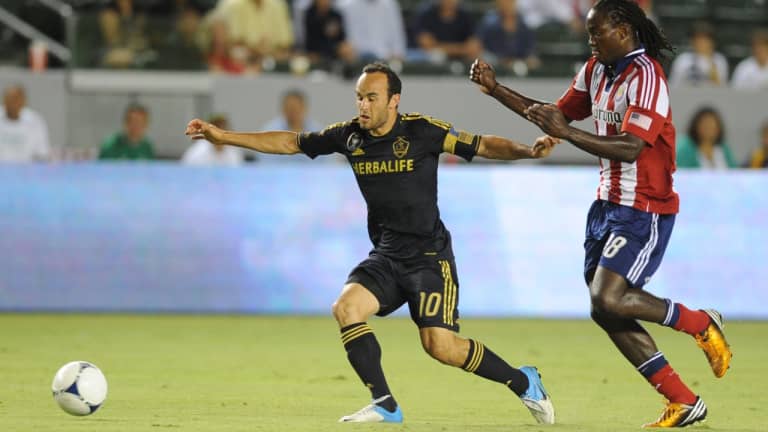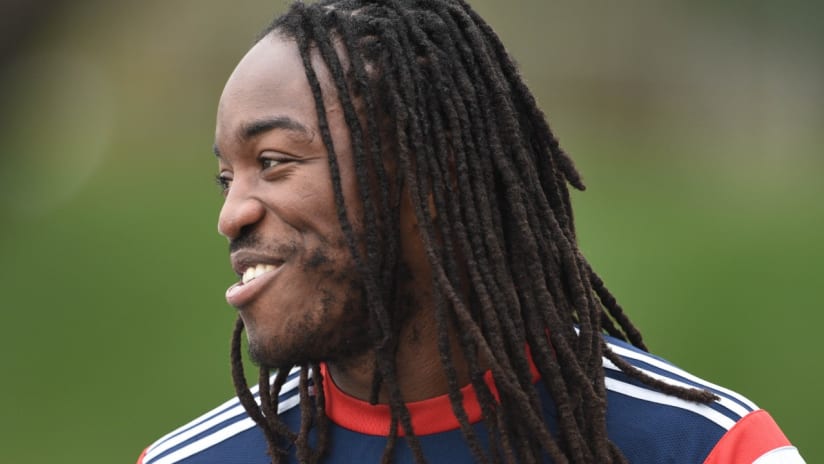He was the dreadlocked enforcer at the heart of the New England Revolution’s salad days, the “emotional leader” and brawny holding midfielder who laid the defensive foundation that allowed the likes of Clint Dempsey, Taylor Twellman and Steve Ralston to wreak havoc in the attack.
Shalrie Joseph was the most fearsome central-mid presence in the league back then, as shown by four MLS Best XI nods from 2005-10 — a span in which the Revs reached four MLS Cup finals — and a couple of seven-figure transfer bids (all declined by the Revs) from Scottish giants Celtic FC.
And today he’s finally come home.
After a challenging but productive two-year stint in charge of the national team of his native Grenada, Joseph is back in Boston, eager to keep advancing his coaching career in a new role with the Revs expected to comprise both academy and first-team involvement. MLSsoccer.com caught up with him for a Q&A on his past, present and future.
MLSsoccer.com: Where are you and how have you been spending your time during the coronavirus lockdown?
Shalrie Joseph: I came back to Boston around March 14, 15, right before everything really started to get more focused. I came back from Grenada [after] two years coaching the national team. … My situation is good, to be fair about it. I get to spend some time with my godkids and my family, I talk to them a lot, and I hang out with my girlfriend and I coach one or two kids on the side, do personal training with kids who have the space.
I do a lot of hiking, I have two dogs and I walk a lot with them. … There’s people in a more dire situation than I am, so I try to stay positive and right now it's just trying to enjoy family time and be at home.
I’m in Winthrop, behind the airport. It’s very quiet – well, not that quiet by the airport! There's a nice park out there and then I spend like, three, four days a week where my godkids live, it’s in the suburbs, a very quiet, very rural area with a lot of trees and stuff, so I get to take them outdoors and I get to hike with them, those are the times I appreciate the most of all. … I really enjoy spending time with them more and more, and just reflecting on things I've done and the things I want to accomplish in my life has given me a better perspective, a clearer view on where I want to go with my life.
MLSsoccer.com: So you’re done with the Grenada national team?
Shalrie Joseph: I’m no longer the coach. We were talking about renegotiating and setting up a new contract but … we just couldn't come to terms. I didn't get what I wanted on my initial offer and they took too long to make offers that I thought were insufficient offers. We weren’t really in the same ballpark. So I walked away from the job and I came back to America to live.
At the end of the day it was a great experience. We qualified for the Gold Cup in 2021, and then we qualified to play in [Concacaf Nations League A], to play with all the better teams in the Concacaf region, which was a great credit to all the players and the staff included, for what we have done with such limited resources and limited backing from the Grenada Football Association. … We did what we were supposed to and it was a great opportunity for me as a coach, having been born in Grenada. So it was very good, a very good experience.
MLSsoccer.com: What’s next in your career?
Shalrie Joseph: Once it was almost a certainty that I would not return to Grenada to continue to coach, I’ve been talking with the Revolution about returning with them. Since the changeover with Mike [Burns, the club’s former GM], the changeover to Bruce Arena and Curt Onalfo, the new GM and sporting director, it’s been a warm and welcoming relationship with both of them. So I was supposed to start early April working with them, working with the academy and then give a hand with the first team, and just work and see how Bruce and [assistants] Richie Williams and Dave ven den Bergh, how they run the first team.
That was my dream job right now, to be able to work with those guys and be a part of their team. But unfortunately, this [pandemic] happened so right now I'm just sitting back and waiting. Once we get a go on MLS to return then I’ll definitely be part of the organization [where] I had my glory days as a player. I look forward to that challenge, I think that’s the best thing for my life right now, is to be next to people that can really teach me and keep the focus on the game itself and learn from the best.
MLSsoccer.com: It sounds like you didn't get the same warmth of reception from the previous Revs leadership?
Shalrie Joseph: We just never got along. [Burns] never had my side when I needed him to be there, he was just never that person, he never had my back. So I understand it’s a business, and they need to do what they thought was best for the franchise. But now [Arena and Onalfo] have come in, they've given me the opportunity, and I understand what they can bring to the organization and I understand how great it'd be for me to be a part of that organization with Bruce and Curt, so I’m looking forward to it.
[Previously] I didn't feel like I got treated the way I was supposed to, having done so much for the franchise. But those are things I learned from and those are things I don't try to hold against people, I just learn from those experiences and try to move forward.
MLSsoccer.com: How did you first wind up in MLS with New England?
Shalrie Joseph: I got drafted No. 12 [in the 2002 SuperDraft], I think. I remember when the draft was going to take place, I was here but I told New England Revolution I was going to go overseas … I wasn't going to play in MLS, that was my initial thought – the money back then was like $22,000, $24,000 [that] players were making per season out of college. I didn’t think it was sufficient to live on.
So I got drafted by the Revolution, even though I told them I wasn’t going to play in MLS, and then I went overseas to train for a little bit. The team over there [Italian club Monza] went bankrupt and then I found myself back in America. Before I knew it I met [Revs coach] Steve Nicol and then that’s when it all took off. My meeting with him just went very well, me and him conversed and talked, he told me how good he can make me and from then on it was just being in New England [Joseph signed with the Revs in 2003 and remained with them until brief late-career stints with Chivas USA and the Seattle Sounders].
MLSsoccer.com: What’s your favorite memory from your time in MLS?
Shalrie Joseph: I have a lot of them, but my favorite memory was the guys that I played with. For me it was just going to work every day, just being able to live out my dreams. I always loved playing soccer … the last year playing with Jay Heaps, I didn’t love it as much, but for me it was always playing soccer every day and to be motivated to train and play and do the things that make me better. So my fondest memories are just playing soccer every day.
MLSsoccer.com: Conversely, what’s one regret from your time in MLS?

Joseph, right, wonders what might've been had he chosen to wait for a US men's national team call-up and a chance to play as a teammate of Landon Donovan, left. | USA Today Sports Images
Shalrie Joseph: I would’ve loved to challenge myself overseas … when Celtic came calling, I think I could’ve been a little more assertive in terms of me wanting to go overseas to challenge myself. And then, I think playing for Grenada [at international level] at a young age, it's something I think about all the time – I would’ve loved the opportunity to represent America, but I got to play for my childhood home, where I was born, from the places where I grew up, playing with some of my best friends, some of the kids I grew up with … [the United States] called me, but it was too late because I had already represented Grenada.
MLSsoccer.com: Who was the best player you played with or against during your time in MLS?
Shalrie Joseph: The best I played against, it had to be Landon [Donovan]. I have fond memories of him talking on the field and then scoring goals. He was by far the best player I played against, and then I think DeRo [Dwayne De Rosario] was very good too. The best player, talent-wise, that I played with was Clint Dempsey. He could do pretty much anything on the ball and he had an arrogance about him that just made you want to be a part of what he was doing – you wanted to play with him. The two smartest players I played with would be Steve Ralston and Michael Parkhurst. They saw the game on another level like you couldn't believe. They would see things that was happening and developing on the field, like ‘wow, how did you see that, how did you read that?’
MLSsoccer.com: What has been the biggest change in MLS since you were playing?
Shalrie Joseph: I think it’s the fanbase. The passion of the fans, it’s something that was there, but now with the influx of all the teams and the stadiums, I think that's the biggest change I've seen around there. And then I think it's important that players are being compensated, that players are being paid for their services. Having started at $22,000 [per season], I think right now it’s $60-70,000 [league minimum]. I think that's great to see, the players being compensated and the growth of money towards players has been growing. So I hope that will continue and you can live off of this money that players are making in MLS today, and no longer have to work afterwards … they can follow their dreams.
MLSsoccer.com: Do you think you’d be just as successful/more successful playing in MLS today? Would you have to adapt?
Shalrie Joseph: I would be just as successful, I think. … anybody who knows me knows, I willed myself to becoming who I was. And once I stepped on the field, you can ask any and everybody, I gave my all, and I always wanted to dominate my position. So no matter what era you put me in, I think I'll be successful. The guys today are a lot more skillful and a lot better at decision-making on the ball. But I think at the end of the day, what separated me was my willingness and my determination to do things that players were not doing back then, and that wouldn't change. My personality wouldn't change.













